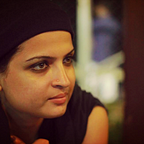A Film On Same-Sex Marriages Faces Censorship In India
Debalina’s ‘Gay India Matrimony’ Deemed Unsuitable For Public Viewing
Debalina is an independent filmmaker and cameraperson based in Kolkata. but travels for work across the country. She studied comparative literature and worked in television before she started to freelance. She has made feature-length documentary films, short films, travelogues, music videos, telefilms, and mixed-genre films. She is also a still photographer and that is how she started her career. Her films were selected in the Berlinale Talent Campus, Mumbai International Film Festival (MIFF), British Film Institute (BFI), International Documentary and Short Film Festival of Kerala, etc.
She completed her latest film ‘Gay India Matrimony’, a tongue-in-cheek look at the institution of marriage. The film follows the lives and imaginations of gay people in a socio-cultural location, which is still struggling to come to terms with homosexuality. Gay India Matrimony is facing erasure because the censor board believes topics of homosexuality are not suitable for minor viewing. So the censor board granted it an ‘A’ certification. This immediately puts the film at a loss in festival selections and other distribution avenues.
I caught up with the director and cinematographer of the film, Debalina, who shares her thoughts on sexuality, dissent, and advocacy.
- Please tell us about your latest film Gay India Matrimony — what was your motivation behind making this film?
The idea first germinated in 2014 when the campaign to repeal Section 377 became active following the Supreme Court verdict in 2013 that recriminalized homosexuality. This was after a brief period of decriminalising consensual adult homosexual Act in 2009. The debate about gay marriage was already quite strongly emerging in some circles by then, despite the possibility of being prosecuted for having a same-sex partner.
I am not in favour of marriage as a logical culmination for romantic partnerships, but I wonder how a same-sex marriage proposal sounds to friends, families, state representatives, and activists.
2. What was the biggest challenge making this, and your biggest learning from this film?
The biggest challenge I faced was when the film was given an ‘A’ certificate by the Censor Board. A year after 377 is repealed, a year after Supreme Court apologised to us for the historical wrong, we are still told off by the examining committee of the Central Board of Film Certification. “The film is based on homosexuality and its social recognition and as such is not fit for minor viewing,” they said. Merely the subject of gay marriage — that is outside the dominant framework of heterosexuality — put the film in the ‘A’ category. The next challenge was when the producer, ‘Films Division’ declared that they do not produce ‘ADULT’ films!
The biggest learning has been the fact that since the film was made over 5 years (2014–2019), lives, narratives and opinions have shifted. Some of my characters have moved cities and some characters have moved from their earlier ideological positions. Characters have expressed how watching their evolution in time has surprised them and also at times made them uncomfortable. The realisation that lives change and opinions shift has been a positive learning experience for me.
3. What were your thoughts when the film was censored for public viewing?
The fact that making a film on same-sex marriages can attract censorship in the form of restricted audience viewing has been a painful experience. This only shows that even today we are not in a position to accept diversity. There is an attempt to weed out differences in the name of producing a sanitised, ordered and homogenous society.
4. What do you think is the future of free speech in a self-styled democracy like India?
I think we are facing restrictions on our freedom in every sphere of life, not just free speech. We as independent filmmakers have always found it difficult to go against the mainstream and make films about issues that focus on marginalised sections of the society. The prime constraint has been funding and Censor Board approvals. Today, the censorship starts even before the film has reached the Censor Board table and this only shows what times we live in.
5. Don’t you fear backlash/ risk of personal harm while making films that are considered “anti-national?”
There were times when some violence happened “there” and to “them.” Like you see severe state repression/violence happening in Kashmir, Northeast India, or in Chhattisgarh regularly. But the gap between them and me/us is fast dissolving such that it has come to envelope me and there no longer exists any “safe distance.” Today, any hint of dissent is considered “anti-national” and what counts as dissent is also defined by the higher-ups.
But that cannot, and has never been able to stop us. So our work has to go on.
— —
You can get to know more about the film here. Watch the trailer of the film here.
Vaishnavi is a writer, self-taught filmmaker among other things. You can read all of her work by signing up for her newsletter.
